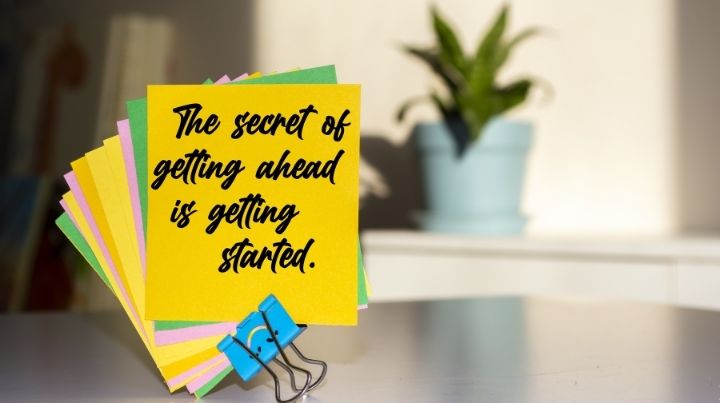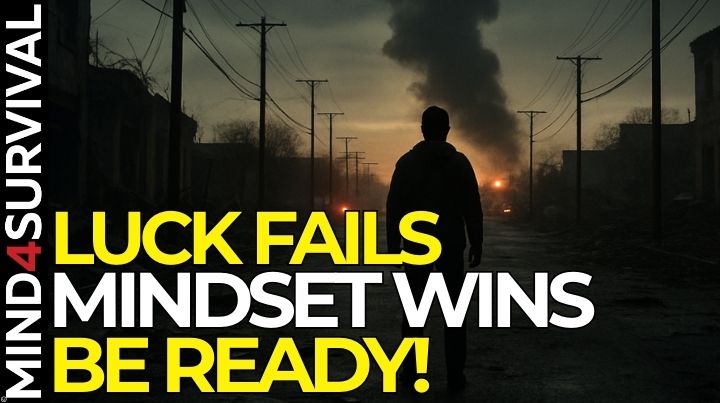40: Getting Started Prepping? These 4 Tips Will Help


Podcast: Play in new window | Download
Here's a secret that nobody tells you when you're getting started prepping. Feeling overwhelmed is totally normal for new preppers.
If that's where you're at right now, you need to know that you are not alone in how you feel. Many people, especially when they first begin to focus on their preparedness, feel as if they are emotionally drowning. After all, it's a lot to take in, and it's completely normal to feel like you're in over your head, especially if they start out reading horror stories about events like EMPs, tsunamis, and the Cascadian Fault.
When people begin the transition from a non-prepper mindset to a prepper mindset, they can be overcome by the feeling that danger is around every corner. The problem is that before opening their eyes to preparedness, people often have normalcy bias. Either that or they've just never thought about the dangers of the world. Then, once their eyes are open and they begin to prepare, they become aware of all the potential tragedies waiting for them.
It's at this point that the overwhelm often sets in.
Go Slow When Getting Started Prepping
Fortunately, the odds of most of the tragic events ever happening is minimal. Therefore, the urgency to become prepared may not be quite as urgent as it initially seems. One way to overcome the feeling of urgency is to take a measured and logical approach to your preparedness. This article contains 5 steps to help guide and reassure you that you're on the right track and probably doing better than you realize.
While we're on that point, it's important to know that more often than not, people are more prepared than they know. Heck, many times, people who are new to prepping are not as new to it as they think. In reality, they have a subconscious that has caused them to prepare without them knowing they are doing it. That is why, when they move to the first tip in the five tips for beginning preppers, inventorying and organizing their supplies and resources, they are often surprised about how far ahead of the preparedness game they are.
Regardless of where you are in that equation, though, it's good to understand that you are on the right track by just taking that initial leap forward and making the conscious decision to prepare. Heck, you are probably more than on the right track. The fact is that by just admitting you need to prepare, you are light years ahead of most other people who never accept they should take the time to improve their readiness.
1) Inventory and Organize Your Supplies and Resources
A great way to establish a solid prepping foundation is to inventory and organize what you already have. This foundation will help you overcome one of the most significant prepping challenges: a shortage of time. The majority of preparedness frustration centers around a lack of time and money. Therefore, it's essential to establish an accurate inventory so that later, as you work on your preparedness, you know what you have and where. This will go a long way to helping you be more efficient with your time.
Knowing what you have on hand can also save you money. Far too often, preppers make the mistake of purchasing, acquiring, etc., gear, supplies, and other items they already have. By completing a thorough inventory, preppers will find that they save more money than those who don't act purposefully when preparing.
2) Perform a Personal Risk Assessment
Perhaps the best way to determine what you need to prepare for is by conducting an individual risk assessment. Realistically establishing what your most significant threats are, provides you with the opportunity to manage those first. Those who are just getting started prepping should focus their initial efforts on the most likely things.
When you prioritize your risks, you are setting yourself up for success should an event occur. Those who fail to prioritize may find themselves addressing problems that don't exist or are so inconsequential that solving them is a waste of time and resources.
Two of the most significant factors to consider when performing a risk assessment are probability and impact.
Probability is the potential of an event happening. Some events have a low chance of occurring, while others have a higher likelihood depending on your area.
Impact refers to how severe the resulting problems will be for you should an event happen. For example, the impact of a fire may be extremely high due to the potential to lose your home, goods, and family as a result. However, a fractured toe is not likely to have a significant impact on your life.
One area that often goes overlooked when preparing is what happens when you are away from home. We are all probably fairly good at thinking through and preparing for emergencies when we're home. However, what happens if a significant earthquake occurs and you're 50 miles from home? Have you performed risk assessments on various aspects of your time when out and about?
3) Create a Plan
A lot of folks think that getting started prepping is all about buying a whole bunch of stuff. It's actually about planning.
As Ted Runci spoke about in episode four, before planning, it's essential to gather all the information you need. By preparing in advance to create your plan, you'll be set with the required information, which will allow you to focus on planning.
When planning, you'll want to determine what your priorities are. Prioritizing aspects of your plan make it possible for you to address the most critical elements first. Often, some portions of your plan experience delay until others are complete, so it's important to know what to do first.
Create courses of action that will allow you to execute the plan as smoothly and efficiently as possible. Knowing in advance what steps to take to respond to various problems will pay dividends when an emergency happens. When we don't think through potential courses of action ahead of time, we set ourselves up for failure.
4) Prepare in Incremental Steps
As you work through your preparations, you should do so in a systematic way that addresses all of your needs equally. For example, having three months of food but no plan for water doesn't do you much good. In other words, as you prepare your food supplies, also prepare your water, medical supplies, etc., evenly so that you are ready if the time comes.
Slow and steady wins the race. When you prepare, you want to make sure you take action in a sustained and logical manner. Remember all of the planning we went over earlier? Well, stick to your plan, and as you go through it, reassess what you're doing. Set yourself with near and far goals and work towards achieving them. It's always good to remember, doing a little bit each day results in significant accomplishments over time.
Don’t panic and try to do everything at once. As we discussed at the beginning, new preppers are often overwhelmed, and some panic when thinking about all they have to do. Don't let this be you. If you do one little prep today, you'll be one prep closer to a positive outcome than you were yesterday. The key is to keep pushing forward. Before you know it, you'll be much better prepared and proud of your accomplishment. And don't let other preppers who seem to have it all together make you feel hopeless. They're probably not as ready as they think they are.
The Bottom Line on Getting Started Prepping
Getting started prepping can be an overwhelming task, but it doesn't have to be. Break it down into the simple steps above, and soon, you'll no longer be a newbie. You'll be giving other people advice.
Additional Resources:
Stay safe,

Related Articles
FREE Guide
Read the Best Seller
Join Mind4Survival
Stay informed by joining the Mind4Survival! 100% Secure! 0% Spam!
Affiliate Disclosure...
Mind4Survival is a free, reader supported information resource. If you make a purchase through our link, we may, at no cost to your, receive an affiliate commission.
Do You Want To Be Ready No Matter What?

Download our free 39-page guide with interactive, 7-Day Emergency Kit Checklist and take the first step toward real preparedness.
- Know exactly where to start.
- Save time and money.
- How-to build a complete Basic Emergency Kit.
- Level up your safety and security.
Join Mind4Survival
Stay informed by joining the Mind4Survival! 100% Secure! 0% Spam!






Evening Brian
I was trying to download your preparedness productivity worksheet . And it would just take me over to a subscription page of some other site.
HOW ABOUT SW RADIO ussa and EUROPE